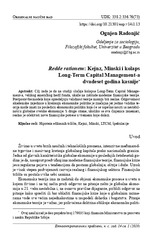| dc.creator | Radonjić, Ognjen | |
| dc.date.accessioned | 2021-10-12T13:00:40Z | |
| dc.date.available | 2021-10-12T13:00:40Z | |
| dc.date.issued | 2019 | |
| dc.identifier.issn | 0353-1589 | |
| dc.identifier.uri | http://reff.f.bg.ac.rs/handle/123456789/2827 | |
| dc.description.abstract | The aim of this paper is to indicate, through study of the Long-Term Capital Management near-bankruptcy case, fallacies of modern financial theory. Model assumptions that determine the validity of theory must be realistic. The responsibility of academic community in the process of creating economic policy is significant since only valid theory could result in economic policies that would successfully deal with the instability of global world economy. On the other hand, if this fact remains ignored, it is reasonable to expect recurrent financial shocks in the future. | en |
| dc.publisher | Univerzitet u Beogradu - Filozofski fakultet - Odeljenje za etnologiju i antropologiju, Beograd | |
| dc.relation | info:eu-repo/grantAgreement/MESTD/Basic Research (BR or ON)/179035/RS// | |
| dc.rights | openAccess | |
| dc.rights.uri | https://creativecommons.org/licenses/by/4.0/ | |
| dc.source | Etnoantropološki problemi | |
| dc.subject | speculation | en |
| dc.subject | Minsky | en |
| dc.subject | LTCM | en |
| dc.subject | Keynes | en |
| dc.subject | efficient market hypothesis | en |
| dc.title | Redde Rationem: Keynes, Minsky and the Collapse of Long-Term Capital Management Twenty Years Later | en |
| dc.type | article | |
| dc.rights.license | BY | |
| dc.citation.epage | 360 | |
| dc.citation.issue | 1 | |
| dc.citation.other | 14(1): 325-360 | |
| dc.citation.rank | M24 | |
| dc.citation.spage | 325 | |
| dc.citation.volume | 14 | |
| dc.identifier.doi | 10.21301/eap.v14i1.13 | |
| dc.identifier.fulltext | http://reff.f.bg.ac.rs/bitstream/id/1506/2824.pdf | |
| dc.identifier.wos | 000462525200014 | |
| dc.type.version | publishedVersion | |

